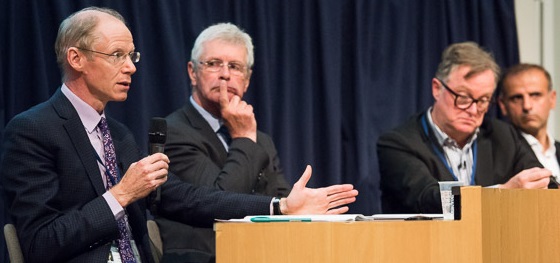
Oxford BRC Director Prof Keith Channon (left) chaired a session on cardiovascular disease and stroke. Picture: John Cairns.
The fourth annual Oxford Technology Showcase was held on Wednesday 6th July at Oxford’s Saïd Business School. The event brought together experts and innovators from Oxford University, the Oxford University Hospital Trust and the Oxfordshire region. Over 300 investors, entrepreneurs, healthcare companies, researchers and clinicians attended.
Working from the theme: “Big Healthcare Challenges in Chronic Disease” delegates heard about new technologies for tackling healthcare challenges such as stroke, cognitive health, ageing, heart disease, diabetes and obesity.
These included virtual reality for treating cognitive disorders, software for surgeon dexterity training and brain mapping and smarphone-based health outcomes measures.
This year Oxford University Innovation again working in partnership with the Oxford Academic Health Sciences Network and, for the first time, with the NIHR Oxford Biomedical Research Centre (BRC). Oxfordshire product design and technology consulting firm Triteq Ltd supported the event as cornerstone industrial sponsor.
Keynote speakers included Prof Keith Channon, Director of the Oxford BRC (pictured), who spoke and chaired a session on cardiovascular disease and stroke.
Speakers also included Professor Tony Young, who is a practicing frontline NHS surgeon and also National Clinical Lead for Innovation NHS England. Tony has founded four med-Tech start-ups. Also from industry, Dr Trevor Howe, European Director for External Innovation, Johnson & Johnson, who serves on several UK scientific advisory bodies and boards.
Oxford startup Bounts talked about the success of their app which provides incentives for people to get active and improve their health. And OxfordVR provides a new virtual reality technology which can help treat severe paranoia by allowing people to face situations that they fear.
Dr Vasiliki Kiparoglou, Head of Operations at Oxford BRC, said: “This was a great event with a lot of engagement from our partners. We were delighted to support efforts to bring together the many experts and innovators from Oxford and wider afield.”
Nick Scott-Ram, Director of Commercial Development, Oxford Academic Health Science Network, said: “The Oxford Technology Showcase has proved itself over the last few years to be a key event for people aiming to gain a view of the innovation ecosystem here in Oxford at work. You can get an insight right through from the origination of an innovation at the University or in the NHS through the development and funding pathways we have to consider, to its use in the healthcare system and patient outcomes we’re aiming to improve.
Linda Naylor, Managing Director of Oxford University Innovation – which so far this year has spun out eleven new companies based on Oxford research – said: “Oxford’s contribution to UK innovation is a key strength of the University, alongside excellence in teaching and research. The Technology Showcase has proved a great place to celebrate this, and a place for academics, industry and investors to gather and exchange ideas.”